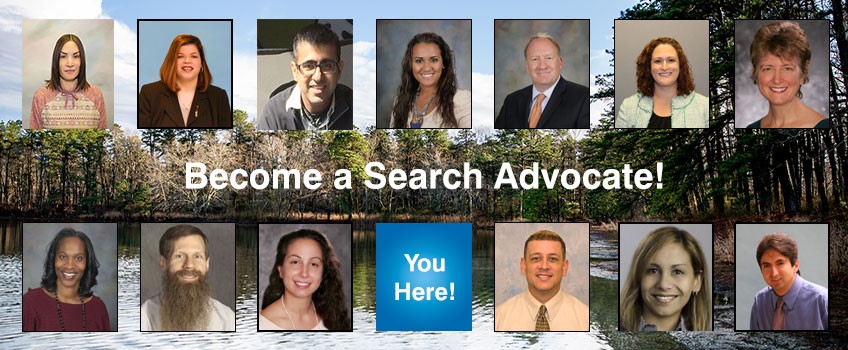Search Advocate Program Addresses Hiring Bias

Top from left to right: Margot Alten, Ariane Newman, Manish Madan, Jessica Grullon, James Trout, Amy Jones and Lisa Honaker. Bottom from left to right: Donnetrice Allison, Robert Olsen, Emari DiGiorgio, Phillip Hernandez, Allison Sinanan and Dennis Fotia.
Chief Officer for Diversity and Inclusion
Stockton’s Search Advocate Program is growing! The program was piloted in November 2016 with a cohort of faculty and staff trained by the individual who developed the search advocate program for Oregon State University. Today, Stockton has 50 faculty and staff trained in the principles of search advocacy, with 45 of them active search advocates.
Search advocates identify and eliminate unconscious or implicit bias risks at all stages of the hiring process, while advancing fairness, equity and inclusion in the search process. To be effective in these complex roles, search advocates bring important strengths to their work with search committees.
Managerial and unclassified (AFT Faculty and AFT Professional Staff) searches must have a search advocate, who become a full member of the search committee and works closely with the search chair.
National Search Advocate Community of Practice
This year, Oregon State University and Stockton University co-founded the National Search Advocate Community of Practice (NSACOP). The NSACOP brings together practitioners from across the country engaged in search advocacy at their respective colleges and universities to address topics of diversity, equity and inclusion in the search process and to share best practices in search advocacy and in higher education.
The first virtual conversation occurred in February, with 300 search advocates from colleges and universities across the country, including Hawaii, that were at various stages of forming and implementing search advocate programs. Sixteen Stockton search advocates registered for the first virtual conversation, which reached its maximum number of attendees within two days of its announcement.
The 90-minute virtual conversation addressed questions from search advocates in several broad areas, such as starting, building and sustaining search advocate programs; doing search advocacy; program training and development; program efficacy; search committees and process; recruitment and anti-racism.
Planning for the second NSACOP virtual conversation is underway and scheduled for a date in June.
Learn more about becoming a search advocate.

